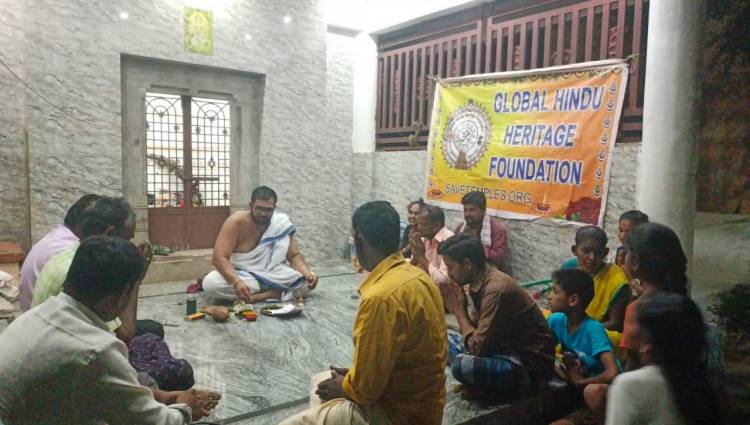[GHHF] Preparations are underway to do Prana Pratishta to Maremma Deity, install Dwajasthamba, and Kalasa on the Gopuram/ Sikhar in Kalyandurg in Andhra Pradesh
 Global Hindu Heritage Foundation is in the forefront in helping the villagers to provide guidance and help them to build Temples and perform Prana Pratishta to the presiding Deities. Villagers from Kalyandurg approached our Chief Prist to assist in the installation of this Devi Mat Temple.
Global Hindu Heritage Foundation is in the forefront in helping the villagers to provide guidance and help them to build Temples and perform Prana Pratishta to the presiding Deities. Villagers from Kalyandurg approached our Chief Prist to assist in the installation of this Devi Mat Temple.
As auspicious time and date was decided to do Prana Pratishta of Maremma deity, installation of flagpole and installation of Kalasa Shikhar as 6th of May next month at New Maremma Devasthanam of NTR Colony in Kalyandurg Mandal Center of Ananthapuram District. On 5th April morning, our Chief Priest Sri Gopi Krishna met with the villagers and talked about the commitment and dedication needed to construct a Temple. He advised them to take an oath to make sure that they will protect the Temple and continue to follow the required rituals.
Along with villagers, Sri Gopi Chary took measurements to set up the flagpole in front of the temple. Similarly, an Invitation letter was prepared to invite people for Prana Pratishta and read to the villagers before it goes for printing. Meeting started from seven o'clock in the evening and discussing about the pooja programs to be done on the third day of the auspicious Day. Muhurta details and step by step procedure for the Prana Pratishta program was prepared and submitted to the villagers to make all necessary arrangements for May 6th.
In the past, GHHF has been requested to do pooja programs on behalf of our organization.
Why Prana Pratishta?
Within Hinduism there are special ceremonies where sacred images are formally installed in temples. These installation ceremonies are generally given two names: Murti Sthapana and Prana Pratishta. The word murti means sacred image and “sthapana” means “placing,” and so the murti sthapana ceremony is the “placing of the sacred image.” The other term, Prana Pratishta is a little less common, but still prevalent. “Prana” means “breath” and “Pratishta” means “establishing,” and so the Prana Pratishta ceremony is literally “establishing the breath” within the sacred image. In other words, it is bringing the sacred image to life. Instead of repeating both terms, I will just use the term Murti Sthapana to mean both.
The process of worship in Hinduism invariably involves the use of 3 basic techniques, namely the mantra, the tantra and the yantra. Symbolically, they represent the 3 basic spiritual paths of Hinduism, made hugely popular by the teachings of Sri Vasudeva Krishna in the famous Bhagavad Gita. The mantra symbolizes the use of Jnana Marg, the path of knowledge, the tantra of Bhakti Marg, the path of devotion, and the yantra of Karmasanyas Marg or the path of detached action. Unless these three are present in some form or combination, the worship is incomplete.
Your donations are appreciated;
By Zelle: ghhfusaorg@gmail.com
PayPal: savetemples.org
By Check: Or you can send a check payable to GHHF, 14726 Harmony Lane, Frisco, TX 75035.
It is tax-deductible.
By Rupees: call 601-918-711; +91 83096 43979.





















 Urgent support needed for Bangladesh Hindus
Urgent support needed for Bangladesh Hindus 







